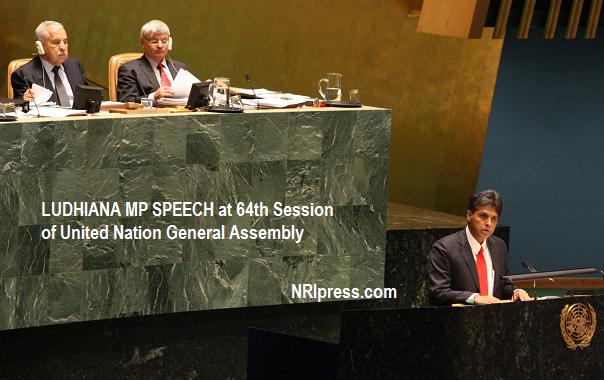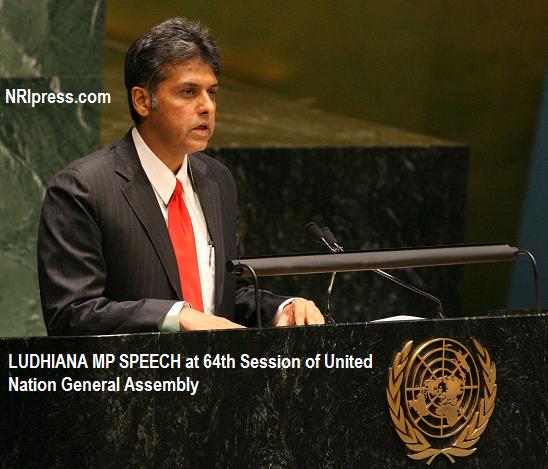LUDHIANA
MP SPEECH at 64th Session of UN General Assembly
NRIs Praise Tewari for His Brilliant
& “terrific” Speech
Nov. 13, 2009
Pawan Dewan/ Raj-NRIpress.com
HON’BLE MR. MANISH TEWARI, MEMBER OF PARLIAMENT AND MEMBER
OF THE INDIAN DELEGATION DURING THE JOINT DEBATE ON AGENDA ITEMS
9 : REPORT OF THE SECURITY COUNCIL; AND 119 : EQUITABLE REPRESENTATION
ON AND INCREASE IN THE MEMBERSHIP OF THE SECURITY COUNCIL AND
OTHER RELATED MATTERS AT THE 64TH SESSION OF THE UN GENERAL ASSEMBLY,
NEW YORK, NOVEMBER 12, 2009

Mr. President,
I am honoured to address the General Assembly on behalf of my
country on the Report of the Security Council and the Question
of equitable representation on and increase in the membership
of the Security Council and related matters.
Let me commence by congratulating Bosnia and Herzegovina, Brazil,
Gabon, Nigeria and Lebanon for having been elected to non-permanent
seats in the Council for the period 2010 to 2011. India looks
forward to working with these countries in a constructive and
positive manner.
We thank the delegation of Austria for introducing the annual
report of the Security Council for the period 1 August 2008 to
31 July 2009.

In our view, the report of the Security Council is an important
means for facilitating interaction between the most representative
organ of the United Nations and its most empowered brethren. The
UN Charter itself bestows on the report a profound gravitas as
is evident from the fact that there exists a separate provision
mandating such a report, rather than clubbing it with the provision
for reports from other UN bodies.
It is, therefore, imperative that the annual report of the Security
Council inform, highlight and analyze the measures that it has
decided upon or taken to maintain international peace and security
during the reporting period.
The membership of the General Assembly has repeatedly requested
that this report be more analytical and incisive than becoming
a mere narration of events. It is important the General Assembly
be aware not only of what decisions were taken, but also the rationale,
efficacy and impact of the Council's decisions, in terms of crystallized
take-aways for the membership of the General Assembly.
Mr. President,
We must recognize that the lacunae in the report are a manifestation
of the underlying problems of representation and working methods
of the Council, which remain opaque and non-inclusive. The report,
this year too, continues to be a statistical compilation of events,
a bland summary and listing of meetings and outcome documents,
as some of the eminent previous speakers also highlighted.
There is no other option but to recognize that the real solution
not only for a more credible, legitimate and representative Council,
but even for a more thorough report lies in the comprehensive
reform of the Council, including expansion in both the permanent
and non-permanent categories, and its working methods.
In this context, it is important to note that an overwhelming
majority of member states have clearly expressed their preference
for such a reform during the three rounds of intergovernmental
negotiations held so far on the issue of reform of the Council.
Mr. President,
Let us recall that since the General Assembly deliberated on
this agenda item last year, intergovernmental negotiations have
finally commenced after years of going around in circles in the
Open-Ended Working Group.
This is a significant development, and the General Assembly must
strongly support expediting the negotiations towards an early
reform.
The most obvious way to achieve such a result is to immediately
convene the negotiations and build on the progress achieved during
the negotiations thus far. This, in-fact, is precisely what the
Assembly has unanimously agreed to do vide its decision on September
14, 2009.
It would also be useful to recall that the preference of Member
States for a Council reform involving expansion in both the permanent
and non-permanent membership category was clearly reflected in
the summaries issued by the Chair of the intergovernmental negotiations.
We would also like to take this opportunity to thank you, Mr.
President, for your leadership and wisdom in reappointing Ambassador
Zahir Tanin, Permanent Representative of Afghanistan as the Chair
of the negotiations during the 64th session. The need for continuity
to ensure success can hardly be overemphasized.
My delegation would also like to congratulate Ambassador Tanin
on his appointment and we wish him all success in his continued
efforts. He can be assured of my delegation's full support in
this very important role.
With a view to focusing the negotiations and moving in a result-oriented
manner, a text from the Chair would be a critical enabler.
Mr. President,
It is imperative that we make genuine and rapid progress on the
issue of UNSC reform, without which the whole process of UN reform
would be incomplete. Our institutions of global governance cannot
remain chained to the balance of power that existed in 1945.
The economic meltdown of 2008 highlighted as to how urgent is
the need for international institutions to reflect contemporary
global reality. This strongly underscores the imperative of a
reform of the Council once again.
Some, though barely a handful amongst us, argue unconvincingly
that an expansion in only the non-permanent category would fulfill
these objectives. Unfortunately, this has not been borne out by
history and the expansion of 1965 is but a testimony to this.
Among areas that require critical attention are proper implementation
of Articles 31 and 32 of the Charter that deal with participation
of non-members in the UNSC’s deliberations, enhancing participation
of Troop Contributing Countries in decision making on peacekeeping
mandates, and increasing the transparency of the Council's work.
We have also heard proposals for interim or intermediate solutions.
However, such ideas raise more questions rather than provide answers.
Let us be clear, pushing this decision into the future does not
solve the problem, it merely enhances an erosion of the credibility
and legitimacy of the Council. The luxury of no action or inaction
is not an option available to the collective will of humanity
represented in this august assembly.
In conclusion, Mr. President, let me reiterate the imperative
for intergovernmental negotiations to resume immediately and make
genuine progress by focusing on expansion in both the permanent
and non-permanent membership categories of the Council.
Thank you.